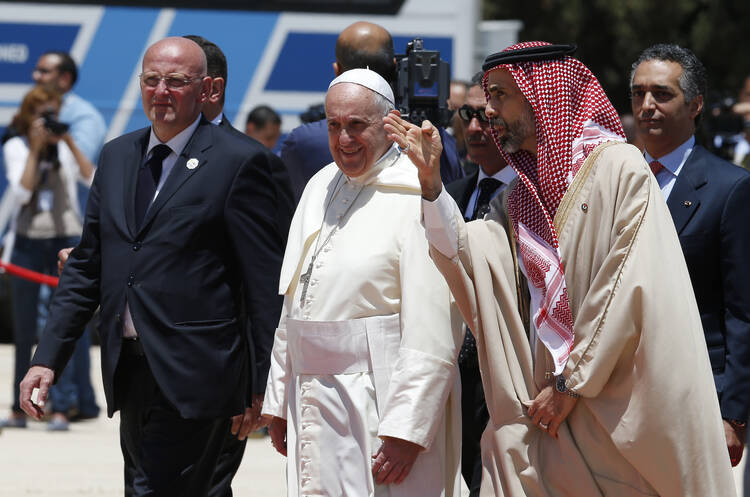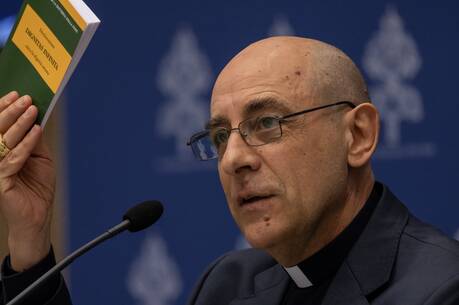Beneath the Latin Church complex or “convent” in the village of Smakieh, Jordan, may be found a set of caverns unearthed by Francisan archeologists in the early twentieth century.
The underground chambers date back to the Stone Age, but what makes them memorable are the small red crosses that mark them as the site of pilgrimages in the Middle Ages. There is evidence, however, that as early as the second century the rooms were used by Christians for their assemblies, making them one of the oldest extant Christian sites that may be still experienced in their ancient form.
The Hashemite Kingdom of Jordan, however, is home today to more than ruins of earliest Christianity. For six decades, since the Palestinian Nakba during the Israeli War for Independence, it has been a safe and welcoming refuge for Arab Christians.
So hospitable has the monarchy been that the late patriarchal vicar for Jordan, auxiliary bishop Salim Sayegh once announced, “We are the happiest Christians in the Middle East.” The capital city of Amman alone hosts ten Roman Catholic parishes. In the country as a whole, there are 35 Latin parishes, not to mention Catholic churches of other traditions, and those of other denominations especially the more numerous Greek Orthodox.
The monarchy, under the leadership of the King’s uncle, Prince El Hassan bin Talal, has been the patron of interreligious studies and encounters for decades. The most recent was an agreement signed with Cardinal Jean-Louis Tauran, the president of the Pontifical Council for Interreligious Dialogue, May 14, on interreligious education as an antidote to current problems.
The best known initiative of the Royal Institute for Interfaith Studies was the 2007 open letter of Muslim scholars to Christian leaders “A Common Word Between Us and You,” responding to Pope Emeritus Benedict XVI’s remarks on unreason and religious violence in his Regensburg University lecture the previous year.
King Abdullah II has been a strong supporter of Christian education, most recently backing the founding of the American University of Madaba, a project of the Latin Patriarchate. The king himself is a graduate of Georgetown University, and is hosting university president John DiGioia and his wife Teresa during today’s papal visit.
Jordan’s major contribution, however, has been as an asylum for refugees from violent convulsions in the region. In the early 1990s, Assyrian and Chaldean Christians fled ethnic cleansing campaigns by Saddam Hussein. The Iraqi dictator, in an effort to Arabize the Assyrians, one of the oldest Christian groups in the world, demolished their villages in their attempt to repress their use of Aramaic, the ancient language of Jesus. They were joined by some Chaldeans who, though they spoke both Arabic and Aramaic, feared the discrimination they faced as a minority in Iraqi cities.
More Chaldeans (Assyrians in communion with Rome) fled Iraq from the sectarian conflict that ensued across Iraq after the American invasion in 2003. The latest wave of refugees to find asylum in Jordan come from Syria, which itself had been an generous host to previous waves of Christian refugees.
Against the background of this history, the sober words of Pope Francis in accepting the welcome of King Abdullah and his court were well-deserved. “Jordan,” the pope said, “has offered a generous welcome to great numbers of Palestinian and Iraqi refugees, as well as to other refugees from troubled areas, particularly neighboring Syria, ravaged by a conflict which has lasted all too long.”
Diplomatically, the pope added, “Such generosity merits the appreciation and support of the international community.” For assistance to the three million Syrian refugees and displaced is grossly undersubscribed. Aid to refugees is, nonetheless, a leading requirement of the emerging post bellum principles of the Just War theory.
Drew Christiansen, S.J. , the former editor of America, is Distinguished Professor of Ethics and Global Human Development at Georgetown University. He is also a canon of the Holy Sepulcher (Jerusalem).








